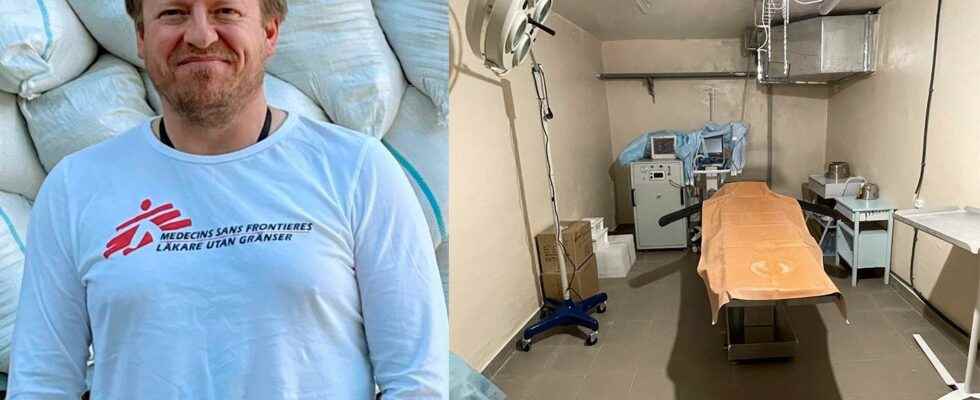1 of 3Photo: Henrik Jörnvall / Kazimi Kuro / MSF / TT (Montage)
With the rumble of war in the background, the Swedish anesthesiologist Henrik Jörnvall is training Ukrainian medical staff in mass injury management and trauma surgery, just an hour and a half from the front line in eastern Ukraine.
The work is complicated by the fact that more and more healthcare employees are fleeing – at the same time as the equipment is running out.
– It is extremely complex, says Henrik Jörnvall.
Flight alarms are heard daily in the city of Pokrovsk, where Henrik Jörnvall and his colleagues live, one and a half hours from the front line in eastern Ukraine. They work with businesses in Batjmut and Kostiantynivka which are even further east.
– In Batjmut, there is shelling all the time. There you hear a constant rumble, but it is difficult to know exactly where, says Henrik Jörnvall when TT reaches him on the phone after the curfew has come into force for the evening.
The cities are located in the countryside where human existence was difficult even before the war began. Now many are fleeing their hometowns. This also applies to care staff, which makes it more difficult to build up care because it must be based on Ukrainian staff who have previously had a well-functioning business, says Henrik Jörnvall. He is on site for Doctors Without Borders (MSF), but is an everyday anesthesiologist and chief physician at Karolinska University Hospital in Solna.
– The functioning operations are now disrupted by broken supply chains and also by personnel problems, and they have a damage panorama that they are not used to. There we can help with training in how to give fast treatment to many at the same time, he tells TT.
“Fumbling in the dark”
Before the war, Ukraine was a relatively well-functioning country with all the infrastructure in place.
– This means that we can not just boot in and solve the problem because it will be very wrong. They grope a little in the dark about what to do and there are challenges everywhere. But they are incredibly proud of their country and welcoming. It is an honor to work here, says Henrik Jörnvall.
The difference is large compared to MSF projects in many other places. The organization works every year in over 70 countries, in a business that is constantly changing and moving according to needs.
– In other wars we come to a place and set everything up from the beginning. We do not do that here, we have a functioning healthcare system that is complicated by more and more people leaving. They have less and less equipment and also move the front, so it is extremely complex to keep up with all this.
Ambulances and blood bank
During his four weeks on site, he works mainly with trauma care and hospitals in the east, partly by ensuring that there is equipment and transport options on site. Quite early there were four ambulances and now seven, which can go to and from the absolute front lines or the hospitals that are there, and all the way to hospitals in the much larger city of Dnipro. Soon there will be eight ambulances. In addition, work is underway to establish a blood bank.
Leaving Sweden and going to a country at war is not an obvious choice for many, but Henrik Jörnvall believes that many at home feel that they can not do anything – or do not know what or how they should be able to make an effort.
– It’s a non-problem for me, because I’m here and can actually do something, so that way I feel better. And then the same when I get home. Then I realize that we live in the best of worlds and we feel incredibly good. So personally, I do not think it is a problem to go here or to go home.
Facts
MSF in Ukraine
Médecins Sans Frontières (MSF) works to meet urgent needs in a variety of places in Ukraine. The organization helps, among other things, healthcare facilities to be prepared for what may come soon. Among other things, medical staff are prepared to be able to handle large influxes of injured people.
To date, Médecins Sans Frontières has delivered 225 tonnes of medical supplies to the country and, in cooperation with the Ukrainian railways, has equipped a train to evacuate patients from conflict zones to safer areas where they can receive care.
MSF first worked in Ukraine in 1999. Following Russia’s illegal annexation of the Crimean peninsula in 2014, MSF began providing medical and humanitarian aid in several areas.
Source: Médecins Sans Frontières
Read more
